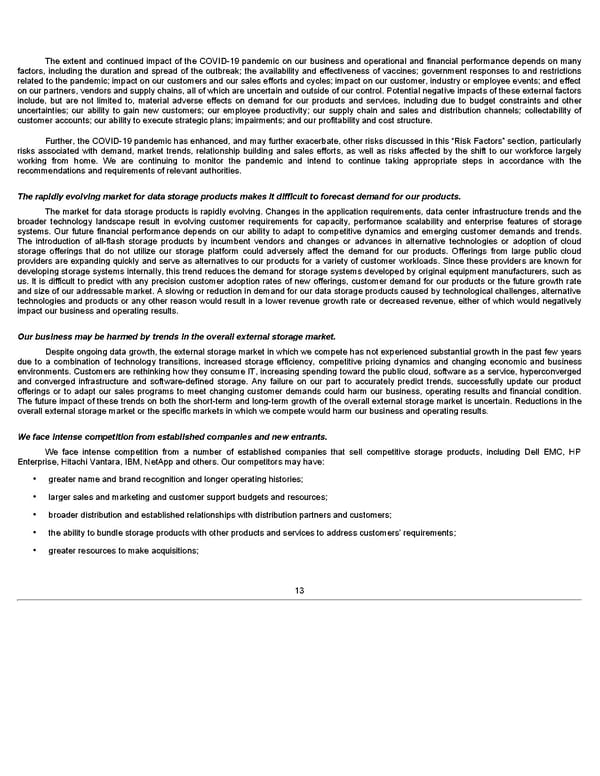The extent and continued impact of the COVID-19 pandemic on our business and operational and financial performance depends on many factors, including the duration and spread of the outbreak; the availability and effectiveness of vaccines; government responses to and restrictions related to the pandemic; impact on our customers and our sales efforts and cycles; impact on our customer, industry or employee events; and effect on our partners, vendors and supply chains, all of which are uncertain and outside of our control. Potential negative impacts of these external factors include, but are not limited to, material adverse effects on demand for our products and services, including due to budget constraints and other uncertainties; our ability to gain new customers; our employee productivity; our supply chain and sales and distribution channels; collectability of customer accounts; our ability to execute strategic plans; impairments; and our profitability and cost structure. Further, the COVID-19 pandemic has enhanced, and may further exacerbate, other risks discussed in this “Risk Factors” section, particularly risks associated with demand, market trends, relationship building and sales efforts, as well as risks affected by the shift to our workforce largely working from home. We are continuing to monitor the pandemic and intend to continue taking appropriate steps in accordance with the recommendations and requirements of relevant authorities. The rapidly evolving market for data storage products makes it difficult to forecast demand for our products. The market for data storage products is rapidly evolving. Changes in the application requirements, data center infrastructure trends and the broader technology landscape result in evolving customer requirements for capacity, performance scalability and enterprise features of storage systems. Our future financial performance depends on our ability to adapt to competitive dynamics and emerging customer demands and trends. The introduction of all-flash storage products by incumbent vendors and changes or advances in alternative technologies or adoption of cloud storage offerings that do not utilize our storage platform could adversely affect the demand for our products. Offerings from large public cloud providers are expanding quickly and serve as alternatives to our products for a variety of customer workloads. Since these providers are known for developing storage systems internally, this trend reduces the demand for storage systems developed by original equipment manufacturers, such as us. It is difficult to predict with any precision customer adoption rates of new offerings, customer demand for our products or the future growth rate and size of our addressable market. A slowing or reduction in demand for our data storage products caused by technological challenges, alternative technologies and products or any other reason would result in a lower revenue growth rate or decreased revenue, either of which would negatively impact our business and operating results. Our business may be harmed by trends in the overall external storage market. Despite ongoing data growth, the external storage market in which we compete has not experienced substantial growth in the past few years due to a combination of technology transitions, increased storage efficiency, competitive pricing dynamics and changing economic and business environments. Customers are rethinking how they consume IT, increasing spending toward the public cloud, software as a service, hyperconverged and converged infrastructure and software-defined storage. Any failure on our part to accurately predict trends, successfully update our product offerings or to adapt our sales programs to meet changing customer demands could harm our business, operating results and financial condition. The future impact of these trends on both the short-term and long-term growth of the overall external storage market is uncertain. Reductions in the overall external storage market or the specific markets in which we compete would harm our business and operating results. We face intense competition from established companies and new entrants. We face intense competition from a number of established companies that sell competitive storage products, including Dell EMC, HP Enterprise, Hitachi Vantara, IBM, NetApp and others. Our competitors may have: • greater name and brand recognition and longer operating histories; • larger sales and marketing and customer support budgets and resources; • broader distribution and established relationships with distribution partners and customers; • the ability to bundle storage products with other products and services to address customers’ requirements; • greater resources to make acquisitions; 13
 Annua lReport Page 12 Page 14
Annua lReport Page 12 Page 14